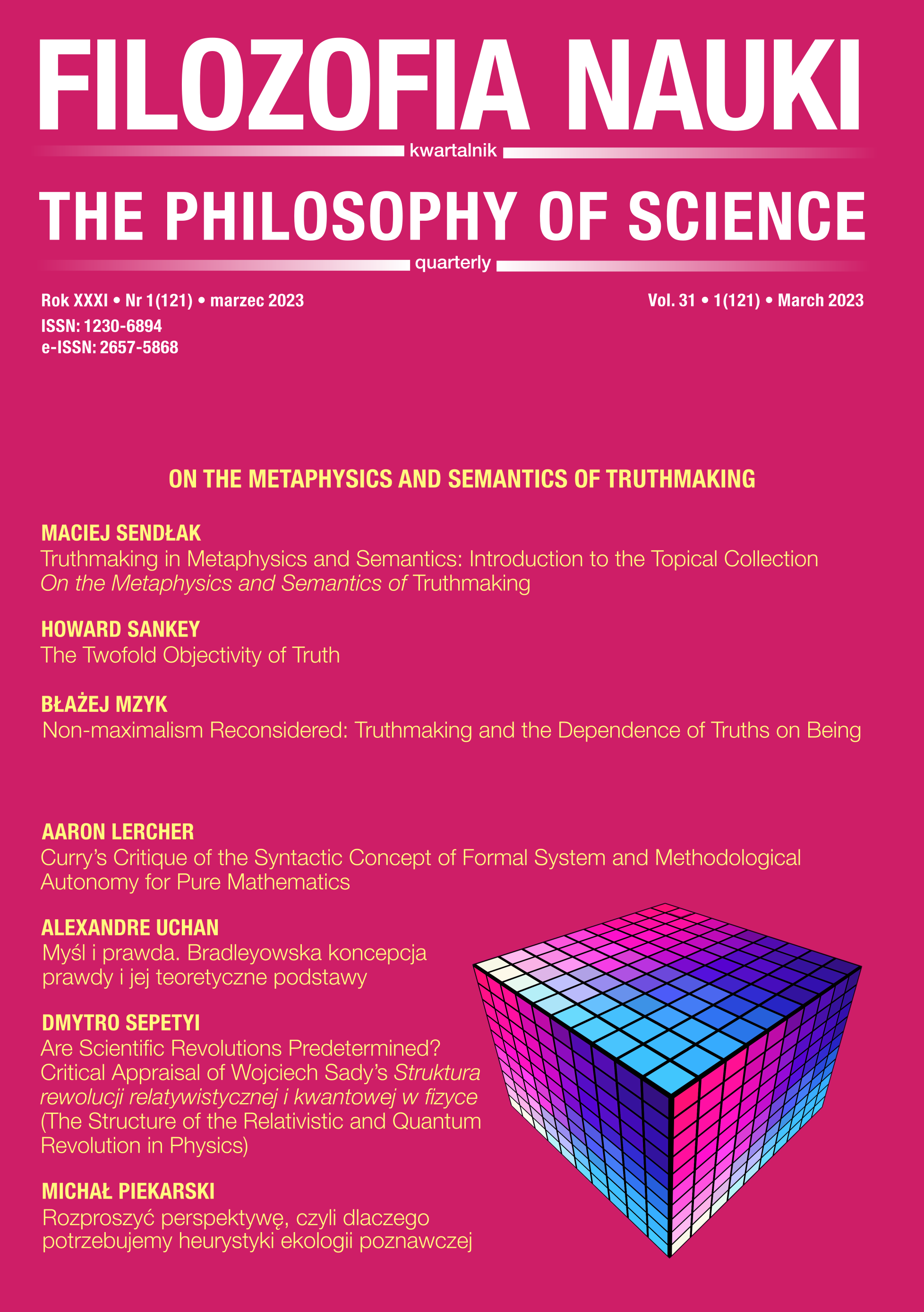Curry’s Critique of the Syntactic Concept of Formal System and Methodological Autonomy for Pure Mathematics
DOI:
https://doi.org/10.14394/filnau.2023.0002Słowa kluczowe:
Haskel Curry, mathematical structuralism, philosophy of mathematicsAbstrakt
Haskell Curry’s philosophy of mathematics is really a form of “structuralism” rather than “formalism” despite Curry’s own description of it as formalist (Seldin 2011). This paper explains Curry’s actual view by a formal analysis of a simple example. This analysis is extended to solve Keränen’s (2001) identity problem for structuralism, confirming Leitgeb’s (2020a, b) solution, and further clarifies structural ontology. Curry’s methods answer philosophical questions by employing a standard mathematical method, which is a virtue of the “methodological autonomy” emphasized by Curry (1951, 1963) and more recently with greater clarity by Maddy (1997, 2007).
Bibliografia
Barendregt H. P. (1984), The Lambda Calculus, revised ed., Amsterdam: North-Holland.
Burgess J. P. (1999), Book Review: “Stewart Shapiro, Philosophy of Mathematics: Structure and Ontology,” Notre Dame Journal of Formal Logic 40(2), 283–291. https://doi.org/10.1305/ndjfl/1038949543
Carnap R. (1959), The Logical Syntax of Language, transl. by A. Smeaton, Paterson, NJ: Littlefield, Adams. [1934 German publication].
Church A. (1941), The Calculi of Lambda-Conversion, Princeton: Princeton University Press. https://doi.org/10.1305/ndjfl/1038949543
Curry H. B. (1950), “Language, Metalanguage, and Formal System,” The Philosophical Review 59(3), 346–353. https://doi.org/10.2307/2181990
Curry H. B. (1951), Outlines of a Formalist Philosophy of Mathematics, Amsterdam: North-Holland.
Curry H. B. (1958), “Calculuses and Formal Systems,” Dialectica 12(3–4): 249–273. https://doi.org/10.1111/j.1746-8361.1958.tb01462.x
Curry H. B. (1963), Foundations of Mathematical Logic, New York: Dover Publications.
Curry H. B. and Feys R. (1958), Combinatory Logic, vol. I, Amsterdam: North-Holland.
Curry H. B., Hindley J. R., and Seldin J. P. (1972), Combinatory Logic, vol. II, Amsterdam: North-Holland.
Dedekind R. (1963), Essays on the Theory of Numbers, New York: Dover Publications. [1872 and 1887 German publications].
Franks C. (2009), The Autonomy of Mathematical Knowledge: Hilbert’s Program Revisited, Cambridge: Cambridge University Press. https://doi.org/10.1017/CBO9780511642098
Hellman G. and Shapiro S. (2019), Mathematical Structuralism, Cambridge: Cambridge University Press. https://doi.org/10.1017/9781108582933
Hindley J. R. and Seldin J. P. (2008), Lambda-Calculus and Combinators: An Introduction, Cambridge: Cambridge University Press. https://doi.org/10.1017/CBO9780511809835
Keränen J. (2001), “The Identity Problem for Realist Structuralism,” Philosophia Mathematica 9(3): 308–330. https://doi.org/10.1093/philmat/9.3.308
Leitgeb H. (2020a), “On Non-eliminative Structuralism: Unlabeled Graphs as a Case Study, Part A,” Philosophia Mathematica 28(3): 317–346. https://doi.org/10.1093/philmat/nkaa001
Leitgeb H. (2020b), “On Non-eliminative Structuralism: Unlabeled Graphs as a Case Study, Part B,” Philosophia Mathematica 29(1): 64–86. https://doi.org/10.1093/philmat/nkaa009
Maddy P. (1997), Naturalism in Mathematics, Oxford: Oxford University Press.
Maddy P. (2007), Second Philosophy: A Naturalistic Method, Oxford: Oxford University Press. https://doi.org/10.1093/acprof:oso/9780199273669.001.0001
Parsons Ch. (2008), Mathematical Thought and Its Objects, Cambridge: Cambridge University Press. https://doi.org/10.1017/CBO9780511498534
Resnik M. (1997), Mathematics as a Science of Patterns, Oxford: Oxford University Press.
Seldin J. P. (2011), “Curry’s Formalism as Structuralism,” Logica Universalis 5, 91–100. https://doi.org/10.1007/s11787-011-0028-3
Simpson S. G. (2009), Subsystems of Second Order Arithmetic, 2nd ed., Cambridge: Cambridge University Press.
Tait W. W. (1986), “Proof and Truth: The Platonism of Mathematics,” Synthese 69, 341–370. https://doi.org/10.1007/BF00413978
Tait W. W. (2005), The Provenance of Pure Reason: Essays in the Philosophy of Mathematics and its History, Oxford: Oxford University Press.
Troelstra A. S. and Schwichtenberg H. (2000), Basic Proof Theory, 2nd ed., Cambridge: Cambridge University Press. https://doi.org/10.1017/CBO9781139168717
Pobrania
Opublikowane
Jak cytować
Numer
Dział
Licencja
Prawa autorskie (c) 2023 Aaron Lercher

Utwór dostępny jest na licencji Creative Commons Uznanie autorstwa – Użycie niekomercyjne – Bez utworów zależnych 4.0 Międzynarodowe.



















 Filozofia Nauki | ISSN 1230-6894 | e-ISSN 2657-5868
Filozofia Nauki | ISSN 1230-6894 | e-ISSN 2657-5868